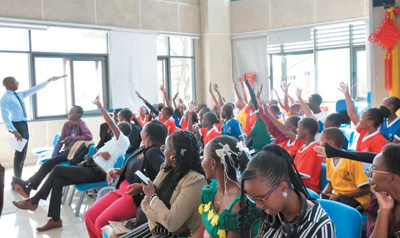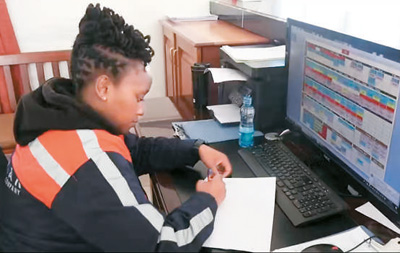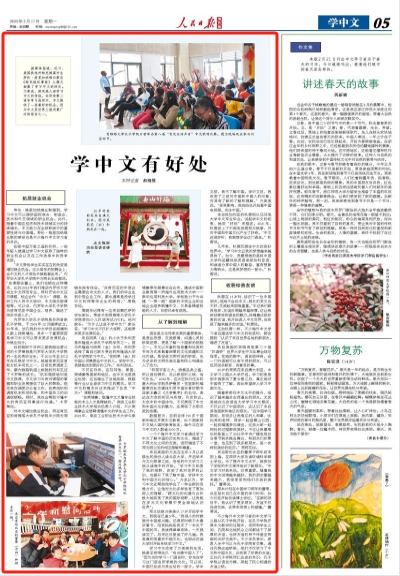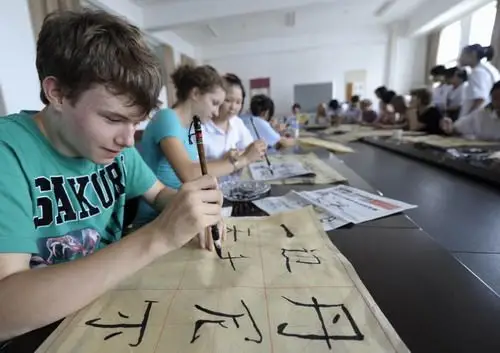
The Confucius Institute at Kenyatta University recently held its eighth “Kenya’s Got Talent” Chinese singing competition. Pictured: Audience participating in a Q&A session.

Jasmine, 20, from Australia. Pictured: Jasmine (right) with friends. All images provided by interviewees.

Caroline is one of the outstanding graduates of the Confucius Institute at the University of Nairobi. Pictured: Caroline at work.

Leti from Colombia (far right) with friends.
According to media reports, Lauren Griganavicius, a high school student from Park City, Utah, recently wrote an article in The Park Record detailing the benefits of learning Chinese. The article notes that Park City has a tradition of learning Chinese. Among all second-language options, Chinese offers some of the best opportunities because it’s one of the most widely spoken languages in the world.
Expanding Job Opportunities
Lauren Griganavicius highlighted that learning Chinese opens doors to careers in international business, manufacturing, technology, and diplomacy. As China’s economic and technological influence continues to grow, Chinese proficiency is becoming increasingly valuable in the global job market. Lauren’s perspective resonates with many overseas Chinese learners.
In Africa, thousands of miles from China, young people are gaining unique job opportunities and competitive advantages through learning Chinese.
“Learning Chinese brings tangible benefits, like better job prospects. You can see this at job fairs, where Chinese-speaking talent is in high demand,” said Wang Shangxue, Chinese director of the Confucius Institute at the University of Nairobi. “To meet this demand, we’ve tailored our programs. In 2023, we helped establish a Chinese language teaching major at the University of Nairobi, along with certificate courses, ‘Chinese+’ industry partnerships, government employee training, and Chinese club courses. Our institute has trained and supplied many bilingual talents to Chinese companies in Kenya.”
The Confucius Institute at the University of Nairobi, the first in Africa, was established in December 2005. Over the past 20 years, its enrollment has grown steadily, largely because learning Chinese offers more career opportunities.
Caroline, a 2010–2012 graduate of the institute, is a prime example. She was among Kenya’s first female locomotive drivers and now works in scheduling at the Africa Star Railway Operation Company. The Mombasa-Nairobi railway has witnessed her growth. “The locomotive training was in Chinese, and my language skills helped me master the course and advance my career. Now, in the scheduling office, I coordinate locomotives and drivers, communicating smoothly with Chinese colleagues and assisting Kenyan colleagues who don’t speak Chinese,” Caroline said.
Zhou Xiaodong, Chinese director of the Confucius Institute at Kenyatta University, echoes this sentiment. “Chinese companies in Kenya need Chinese-speaking talent. Our graduates working for these companies often earn double the salary of peers who don’t speak Chinese.”
Zhou recalls a parent from Mombasa who brought their child to take the Youth Chinese Test (YCT) at the institute. When asked why, the parent said, “Learning Chinese broadens horizons and brings more opportunities.”
Julien, a young man from the Democratic Republic of Congo, studies at the Confucius Institute at the University of Burundi, chosen for its proximity to his hometown. “Chinese companies in Congo need people who speak Chinese. Mastering it means better job prospects,” Julien said.
Beyond Africa, in places like Malta, Thailand, and Cambodia, knowing Chinese is a job market advantage, driving demand among tourism and railway industry workers. This, in turn, has spurred the development of “Chinese+” courses and training programs.
“In Cambodia, local talent fluent in Chinese and skilled in specific fields is rare,” said a representative from Nanjing Vocational University of Industry Technology. Many Cambodian companies seek Chinese-speaking employees. In 2023, the university partnered with the Cambodia-China Council to establish the Cambodia-China University of Technology and Science, the first Chinese vocational university overseas. The school trains bilingual, skilled talent for Chinese and local companies in Belt and Road countries, with notable success.
From Awareness to Understanding
Language is a vital carrier of cultural heritage, a bridge for expressing thoughts, sharing emotions, and connecting hearts. It’s also a key to understanding a country. Chinese, with its rich information and elegant script, carries profound cultural depth, fostering dialogue between civilizations and injecting vitality into cultural exchange and mutual understanding.
In 2022, Italian astronaut Samantha Cristoforetti, while on a space mission, quoted a famous line from Chinese calligrapher Wang Xizhi’s Lantingji Xu on social media: “Gazing up at the vastness of the universe, looking down at the abundance of life, it broadens the mind and delights the senses.” Her use of Chinese poetry from space sparked buzz, showcasing the charm of Chinese language and culture and the romance of cross-civilizational exchange.
Data shows that Chinese education is conducted in over 190 countries, with 85 incorporating it into their national systems. More than 30 million people worldwide are currently learning Chinese.
Through learning Chinese, overseas learners gain insight into China’s history and culture, fostering cross-cultural exchange and mutual respect between civilizations.
Fang Long from the U.S. enrolled at Peking University as an advanced student in September last year, embarking on an academic and cultural journey. His Chinese learning began in high school. “Learning Chinese broadened my perspective, reshaped my worldview, and boosted my confidence in understanding China and its culture,” Fang Long said. He believes Chinese taught him a new way of thinking, deepening his appreciation for cultural diversity. “Cross-cultural communication and collaboration have greatly expanded my global perspective, helping me see the world more fully.”
Meimei, a Dutch girl, started learning Chinese at 17 and has been at it for over five years. “I’ve been fascinated by China since I was young. I wasn’t much of a reader, but my mom got me a book about China, and I devoured it in a day, rereading it several times. I love Chinese culture, so I began studying Chinese systematically in college.”
Learning Chinese transformed Meimei’s life—she even feels “a bit Chinese.” “When you learn a language, you’re also learning its culture. China’s become part of my life. Before, I didn’t understand China. Now, I have a new perspective and appreciation,” she said. Inspired by her, her mom started watching Chinese dramas and following Chinese culture.
Qiu Rong from Bulgaria recently graduated from the Chinese program at the University of Malta. She describes her motivation as “fun.” In 2021, she became hooked on Chinese dramas and Tai Chi, sparking curiosity about China. “Chinese sounds beautiful, and I wanted to master it,” Qiu Rong said.
Over the years, Qiu Rong immersed herself in the wonders of Chinese. “Learning Chinese has made my dreams more concrete. My biggest goal is to translate Chinese literature into English or Bulgarian to share the diligence and imagination of Chinese people with readers. That’s part of my dream,” she said.
Building Precious Friendships
At 13, Qiu Rong met a Chinese friend but struggled to communicate due to language barriers. “We didn’t give up, and our friendship grew stronger. It showed me the power of language. That bond led me to the world of Chinese and brought even more friendships,” she said.
Like Qiu Rong, many overseas Chinese learners mention “making new friends from around the world and strengthening bonds” as a key benefit.
Xiaoyu Li from the U.S., the global champion of the 20th “Chinese Bridge” competition for university students, sees language as magical. “Knowing a foreign language lets you make different friends and experience exciting, interesting things,” she said.
Jasmine, 20, from Australia, began learning Chinese in college after a summer camp in China sparked her interest in the culture. As her Chinese improved, she made more like-minded friends, especially while studying at Beijing Language and Culture University. She connected with Chinese and international students alike. “Studying in China gave me unforgettable memories—strolling through Jingshan Park with teachers and classmates, performing in Fujian, and bonding together. The highlight was performing on the 2025 CCTV Spring Festival Gala stage with friends and meeting new people. It was an incredible experience,” Jasmine said.
Leti from Colombia came to Shanghai two years ago to pursue a master’s in environmental science at Tongji University. To improve her Chinese, she took university Chinese classes and made new friends. “Learning Chinese is so important to me. As my skills improved, my social circle grew, and I love connecting with them,” Leti said.
Originally planning a two-year stay, Leti decided to extend her time in China and is now pursuing a PhD. “In my new projects, I’ve met more friends. These friendships not only foster communication but also spark new ideas,” she said.
For many, the journey of learning Chinese begins at Confucius Institutes. Through their teaching, deep bonds form between teachers, students, and local communities, planting seeds of friendship that extend to broader exchanges between nations. Many learners express gratitude for their connection to Confucius Institutes, which serve as bridges for learning Chinese and its culture while fostering cherished friendships. As the institutes’ community agrees: Confucius Institutes, through language, build bridges of mutual understanding and friendship.










